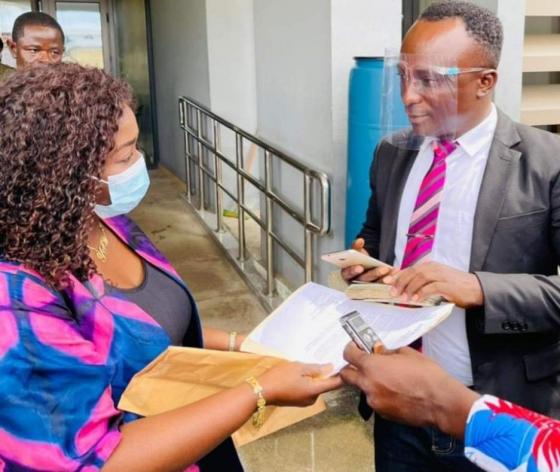Health Minister Cites ‘Undefined Purposes, Public Outcry’ as Reasons for Rejecting US$7,500

Montserrado County Health Officer Yatta Wapoe, Dr. Jallah said, “While the I.M.S. appreciates Senator Dillon’s kind gesture, the I.M.S., however, wishes to inform you (Montserrado County Health Officer Dr. Yatta Wapoe) that she cannot accept such a donation from the Senator
After pronouncing earlier without a genuine reason that the Incident Management System (IMS) was not accepting the US$7,500 donated by Montserrado County Senator, Abraham Darius Dillon to fight the COVID-19 pandemic in Liberia, Health Minister Dr. Wilhelmina Jallah has underscored “public outcry and polemic” accompanying the $15,000 to lawmakers as a reason for rejecting the gesture of the Senator.
In a letter to Montserrado County Health Officer Yatta Wapoe, Dr. Jallah said, “While the I.M.S. appreciates Senator Dillon’s kind gesture, the I.M.S., however, wishes to inform you (Montserrado County Health Officer Dr. Yatta Wapoe) that she cannot accept such a donation from the Senator or any other legislator at the time of ongoing polemic and public outcry concerning the source and exact purpose of the funds.”
Last month the Executive, the branch of government headed by the President, under which Minister Jallah directly works, released US$15,000 to each member of the Legislature (Senators and Representatives) for what was legislated as “Legislative Engagement Project.” Whenever a budget is enacted into law it becomes a law, and wherever it is channeled in line with the reason (s) stated in the law remains legitimate.
Despite the legality of this money, Minister Jallah expounded further that, “We are aware of members of the Legislature receiving US$15,000 (Fifteen thousand United States Dollars) for purposes not defined. We therefore, firmly encourage the Senator to consider other priorities rather than dragging the I.M.S. into USD$15,000 controversy.”
The Health Minister indicated further that the I.M.S receives donations from private individuals and institutions and is cautious of sources of such resources from Dillon amid the consequences. “Kindly, therefore return to the Senator said donation until further clarification.”
After receiving the money on July 20, 2021 in the office of Dillon at the Capitol, the political officer in the office of the Montserrado County lawmaker, Abel Plackie, said they are surprised by the action of the Health Minister to reject money meant for fighting a disease that is destroying lives in the country.
“I remember when Ebola was here; former President Ellen Johnson Sirleaf, who served as the standard-bearer of the Unity Party, welcomed the gesture of then Representative Saah Joseph, an opposition member of the Congress for Democratic Change (CDC), and honored him for his role in the fight against the virus. She did the same with the late Munah Pelhem Youngblood of the CDC when she donated an ambulance. For this CDC Government, it considers everything political and the Health Minister, who should be concerned about the health of people in the country, is now delving into politics,” said Plackie.
When Senator Dillon revealed to the public that his office has received this money that is the half of $30,000 lawmakers are entitled to receive, it was greeted with public disdain with a call that the Executive should have used the money to fight the health crisis in the country, rather than giving it to lawmakers to facilitate their campaign for the 2023 presidential and legislative elections.
Some civil society organizations and individual advocates, terming the amount as “corruption money”, went on to criticize Senator Dillon for receiving it, stressing that Dillon, who refers to himself as “the light” in the Senate, should not have received the money.
Abel Plackie, defended his boss that the money is a legitimate money that was legislated and the Senator should not be barred from receiving it.
“What would be a problem is, if the Senator does not use the money for its intended purpose, then, he becomes guilty of his own principles he preaches, but he disclosed receiving the money and solicited views from the public out there as to what the people of Montserrado County want to do with this money,” Plackie said earlier.
As public criticisms heightened, Senator Dillon first decided to turn the money over to the Liberia Agency for Community Empowerment (LACE), the institution established by law to implement government projects in communities, for a library construction project in Montserrado. LACE rejected the money on ground that it has a set structure and process through which money is transferred to them to implement development projects.
Following LACE’s technical excuse, Senator Dillon donated half of the $15,000 to the Montserrado County Health Team to fight COVID-19, which the MCHT received gladly at first. However, on the following day, the health team emerged with a statement that it would not use the money, and was returning it to Senator Dillon with a caution that the health workers’ jobs were at stake.
